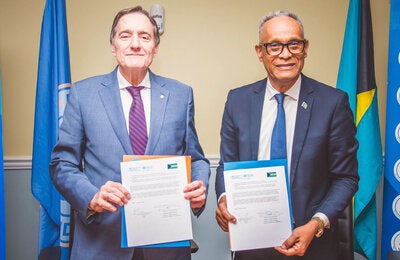

The Pan American Health Organization (PAHO/WHO) in Brazil and the Ministry of Health supported the Regional Meeting of the Dengue Vaccine Initiative, organized by the International Vaccine Institute, which took place in Brasilia.
The Pan American Health Organization (PAHO/WHO) in Brazil and the Ministry of Health supported the Regional Meeting of the Dengue Vaccine Initiative, organized by the International Vaccine Institute, which took place in Brasilia. The opening ceremony was attended by the PAHO/WHO Representative in Brazil, Diego Victoria, the Secretary of Health Surveillance of the Ministry of Health, Jarbas Barbosa, the head of PAHO's Area of Immunization, Cuahtemoc Ruiz and the Director of the International Vaccine Institute, Luiz Jacintho.

The mission of the Dengue Vaccine Initiative is to encourage the development and use of vaccines to prevent dengue cases throughout the world. As a consortium of organizations committed to a world without dengue, IVD is working to lay the groundwork for introduction in endemic areas of a dengue vaccine that, once licensed, can be quickly adopted in these areas.
Other PAHO/WHO experts who are participating in the meeting are Enrique Gil, Manager, Prevention and Control of Communicable and Noncommunicable Diseases; Jose Luis San Martin, Regional Advisor for dengue; Alfonso Tenorio, Coordinator of the Communicable and Noncommunicable Diseases Unit; Brendan Flannery, International Consultant on Immunization; Eric Martinez, PAHO International Consultant on dengue, and Harold Bezerra, PAHO National Consultant for dengue.
PAHO/WHO plays an important role in the introduction of vaccines in the Americas, the region that the World Health Organization considers most able to introduce new vaccines. According to the 47th Directing Council of PAHO/WHO, the Organization has among its duties to support countries in decision-making, development of strategies for introduction, strengthening of their capacities, preparation of human resources, cold chain, surveillance, laboratories and development of capabilities to calculate cost/benefit, among others.
At the current stage of development, a dengue vaccine is expected to be ready by 2015. However, the transformation of this tool into a victory against dengue will require great effort not only of the global health system but of the governments of endemic countries as well. PAHO/WHO reaffirms its commitment to its member countries to support them in this regard.



